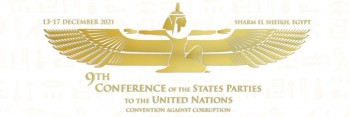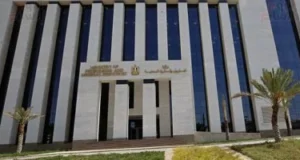Recovering with integrity from the pandemic

الحدث – القاهرة
Preventing and countering corruption is essential to coming out of this crisis stronger, more transparent, accountable and resilient
The COVID-19 pandemic has been an unprecedented emergency for the global community and affected almost every aspect of society as well as creating opportunities for corruption to thrive.
Governments have dedicated enormous resources to responding to the pandemic and its resulting economic challenges while needing to act quickly in the evolving crisis. Since corruption flourishes in times of medical and economic emergencies where disorder and confusion are prevalent, swift action is needed by Member States to counter corruption and emerge stronger and more resilient from the COVID-19 pandemic.
The impact of the pandemic on the healthsector has been immense. The demand, procurement and distribution of equipment and supplies have skyrocketed. At the same time, opportunities for corruption have grown, targeting public procurement and stimulus funds. Shortages of medical supplies and equipment combined with long, complex supply chains have caused intense competition between buyers, who need to fill supply gaps, while suppliers may increase costs to maximize profits. Lack of proper oversight, transparency and accountability in these processes in the public health sector can then afford opportunities for resources and profits to be diverted. Slow and decentralized procurement processes without adequate anti-corruption safeguards can give rise to the misappropriation of funds, non-compliance with procurement regulations, sale of substandard or fake products, bribes and collusion.
Organized criminal groups have exploited the pandemic for financial gain, including by selling falsified medical products or testing kits or illegally obtained drugs. Corruption in the private sector has also had a severe impact on the COVID-19 recovery process and undermined COVID-19 assistance and recovery packages.
Corruption not only damages efforts to rebuild from the pandemic but also undermines public trust in democracy and institutions. Corruption fuels instability and conflict, erodes human rights, hurting marginalized and vulnerable groups the most, including women and children.
The rapid development of vaccines has added to the risk of corruption and profiteering. The race to manufacture, allocate and distribute an effective vaccine coupled with tests for the COVID-19 virus and antibodies promises immense profits, which increases the risk of corruption. Corrupt industry or public officials could potentially use their insider knowledge to profit from the approval of a particular vaccine.
Corruption in disbursement processes during the COVID-19 pandemic is taking various forms, such as embezzlement, preferential treatment, unrecorded overpayments or trading in influence. The consequences can be devastating for those outside these, often male-only, insider networks. In particular, women, youth and the less privileged stand to lose income, opportunities, education and jobs.
Impact on the Sustainable Development Goals
Preventing corruption unlocks progress towards the Sustainable Development Goals. It helps protect our planet, create jobs, achieve gender equality, and secure wider access to essential services such as health and education. Corruption is detrimental to crisis response and recovery and the achievement of the Sustainable Development Goals.
The need to effectively tackle corruption is rooted in Goal 16 – peace, justice and strong institutions -and is essential for achieving all 17 Goals. Corruption is a barrier to economic development and can fuel political instability, erode human rights, increase inequality and supress gender equality.
What is UNODC doing about it?
The United Nations Office on Drugs and Crime (UNODC) is a key partner for Member States in strengthening international cooperation to prevent and counter corruption and enabling recovery from the COVID-19 pandemic. In the framework of the United Nations Convention against Corruption (UNCAC), the Office provides technical assistance, develops innovative solutions to prevent corruption, and assists Member States in effectively addressing various forms of corruption.
Since the COVID-19 crisis began, UNODC has published a series of policy papers to address the challenges and propose recommendations for the immediate and long-term response to the COVID-19 pandemic.
“G20 Good Practices Compendium on Combating Corruption in the Response to COVID-19” analyses the results of a survey of the G20 community on key corruption risks observed during the pandemic. It also discusses good practices and approaches implemented by countries to mitigate specific corruption challenges.
A paper entitled ‘COVID-19 vaccines and corruption risks: preventing corruption in the manufacture, allocation and distribution of vaccines’ outlines ways to identify and mitigate such corruption risks and how governments can increase their preparedness for potential future crises.
‘Accountability and the Prevention of Corruption’ elaborates on the different policy responses that Member States can take immediately to counter corruption and aspects to consider for preventing corruption during the pandemic.
What needs to be done?
The UN System is prioritizing the fight against corruption through a “One UN” approach to support the international community’s efforts.
The UN Global Task Force on Corruption, which UNODC co-leads, produced ‘Corruption and COVID-19: Challenges in crisis response and recovery’ . This UN System-wide Policy Paper sets out a range of potential policy responses and concrete actions Member States may take to better recover and respond to COVID-19 and future emergencies, including various considerations to prevent corruption during the pandemic.
During emergency responses and COVID-19 recovery, Member States must remain accountable for how their resources are spent, including compliance to standards and efficiency of delivery. Institutions in charge of procurement should be strengthened. Guidelines on integrity in public-private partnerships should be provided, stressing the importance for private companies to adopt and strengthen integrity and transparency measures.
Safe reporting channels for whistle-blowers should be established to counter corruption and allow people to report acts of corruption easily and anonymously. Such channels would also raise awareness of hidden mismanagement and reduce waste and corruption.
In a world impoverished by the crisis, corruption is stealing valuable resources just when they are most needed. Developed and developing countries need to unite and accept the COVID-19 pandemic as global problem with shared responsibilities. Tackling corruption will be an integral part of recovery from the pandemic for all countries.
 +00000000
+00000000











